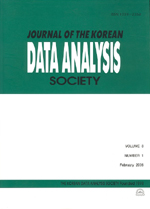Non-employment Duration of Recent Korean College Graduates and Usual Suspects: Evidence from the Classical Job Search Model
- 한국자료분석학회
- Journal of The Korean Data Analysis Society (JKDAS)
- Vol.18 No.2
-
2016.04639 - 651 (13 pages)
- 5

This paper estimated the classical job search model for the Korean college graduates. Using the 2005GOMS (graduates occupational mobility survey), the job-arrival rate and the wage offer distribution are separately estimated. The estimation results provide interesting insight for the recent college graduates long non-employment duration. More specifically, the high reservation wage turns out to be attributable only partly to the observed long non-employment duration of Korean college graduates. Rather, a more significant determinant is estimated to be the infrequency of wage offers. Some counterfactual experiments reveal that lowering the reservation wage plays a very limited role in shortening the non-employment duration of the recent college graduates. But the increase of the job-arrival rate has a more significant impact. For example, the non-employment duration of college graduates falls by 1.2 months when the job-arrival rate increases by 10% from the status quo.
1. Introduction
2. Model and Econometric Specification
3. Structural estimation and estimation results
4. Counterfactual experiments
5. Conclusions and policy implications
References
(0)
(0)